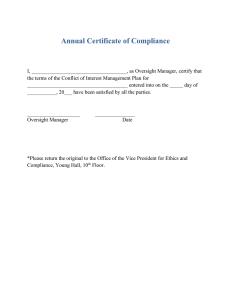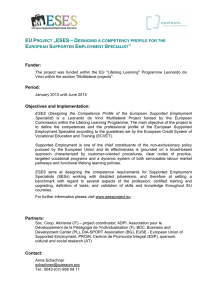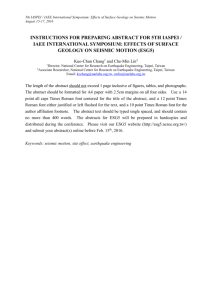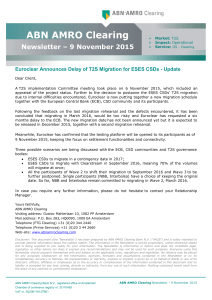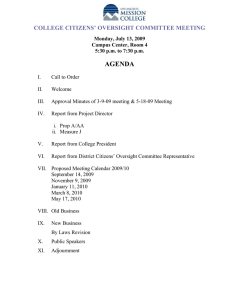Box 2 – Working arrangements for the oversight and supervision of
advertisement
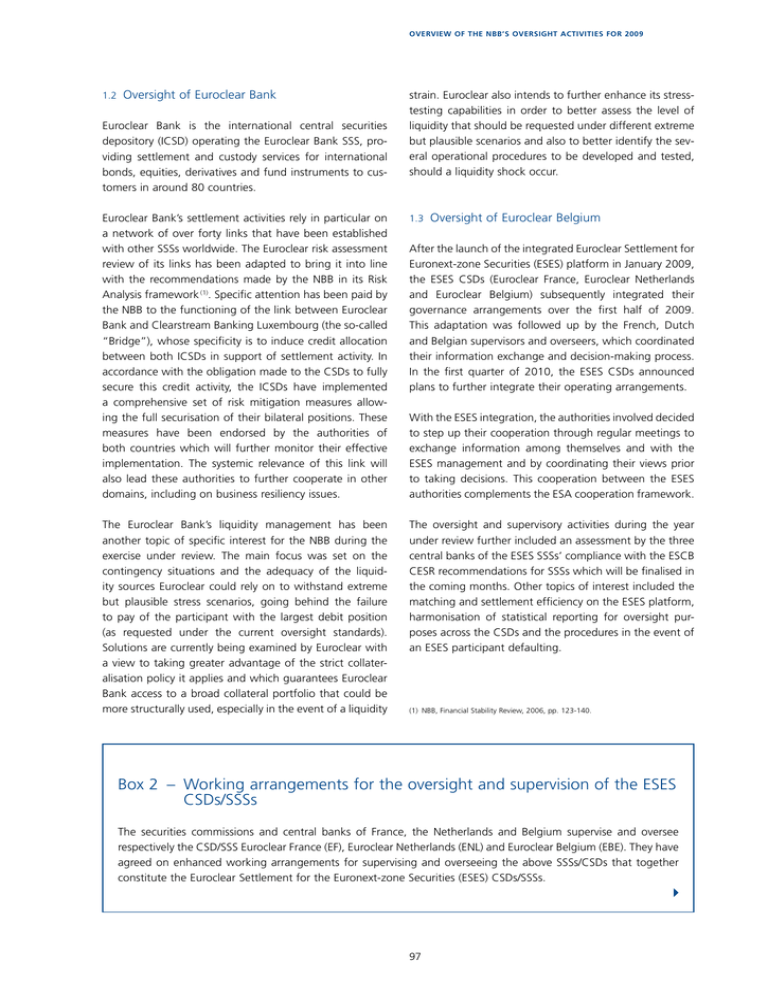
Overview of the NBB’s oversight activities for 2009 1.2 Oversight of Euroclear Bank Euroclear Bank is the international central securities depository (ICSD) operating the Euroclear Bank SSS, providing settlement and custody services for international bonds, equities, derivatives and fund instruments to customers in around 80 countries. strain. Euroclear also intends to further enhance its stresstesting capabilities in order to better assess the level of liquidity that should be requested under different extreme but plausible scenarios and also to better identify the several operational procedures to be developed and tested, should a liquidity shock occur. Oversight of Euroclear Belgium Euroclear Bank’s settlement activities rely in particular on a network of over forty links that have been established with other SSSs worldwide. The Euroclear risk assessment review of its links has been adapted to bring it into line with the recommendations made by the NBB in its Risk Analysis framework (1). Specific attention has been paid by the NBB to the functioning of the link between Euroclear Bank and Clearstream Banking Luxembourg (the so-called “Bridge”), whose specificity is to induce credit allocation between both ICSDs in support of settlement activity. In accordance with the obligation made to the CSDs to fully secure this credit activity, the ICSDs have implemented a comprehensive set of risk mitigation measures allowing the full securisation of their bilateral positions. These measures have been endorsed by the authorities of both countries which will further monitor their effective implementation. The systemic relevance of this link will also lead these authorities to further cooperate in other domains, including on business resiliency issues. 1.3 The Euroclear Bank’s liquidity management has been another topic of specific interest for the NBB during the exercise under review. The main focus was set on the contingency situations and the adequacy of the liquidity sources Euroclear could rely on to withstand extreme but plausible stress scenarios, going behind the failure to pay of the participant with the largest debit position (as requested under the current oversight standards). Solutions are currently being examined by Euroclear with a view to taking greater advantage of the strict collateralisation policy it applies and which guarantees Euroclear Bank access to a broad collateral portfolio that could be more structurally used, especially in the event of a liquidity The oversight and supervisory activities during the year under review further included an assessment by the three central banks of the ESES SSSs’ compliance with the ESCB CESR recommendations for SSSs which will be finalised in the coming months. Other topics of interest included the matching and settlement efficiency on the ESES platform, harmonisation of statistical reporting for oversight purposes across the CSDs and the procedures in the event of an ESES participant defaulting. After the launch of the integrated Euroclear Settlement for Euronext-zone Securities (ESES) platform in January 2009, the ESES CSDs (Euroclear France, Euroclear Netherlands and Euroclear Belgium) subsequently integrated their governance arrangements over the first half of 2009. This adaptation was followed up by the French, Dutch and Belgian supervisors and overseers, which coordinated their information exchange and decision-making process. In the first quarter of 2010, the ESES CSDs announced plans to further integrate their operating arrangements. With the ESES integration, the authorities involved decided to step up their cooperation through regular meetings to exchange information among themselves and with the ESES management and by coordinating their views prior to taking decisions. This cooperation between the ESES authorities complements the ESA cooperation framework. (1) NBB, Financial Stability Review, 2006, pp. 123-140. Box 2 – Working arrangements for the oversight and supervision of the ESES CSDs/SSSs The securities commissions and central banks of France, the Netherlands and Belgium supervise and oversee respectively the CSD/SSS Euroclear France (EF), Euroclear Netherlands (ENL) and Euroclear Belgium (EBE). They have agreed on enhanced working arrangements for supervising and overseeing the above SSSs/CSDs that together constitute the Euroclear Settlement for the Euronext-zone Securities (ESES) CSDs/SSSs. 4 97 The enhanced working arrangements are deemed appropriate as, since January 2009, the ESES CSDs/SSSs have been settling securities transfers on a single IT platform where services, market practices and tariffs are largely harmonised. And since March 2009, the ESES CSDs have streamlined the ESES CSDs’ governance so that the membership composition of the board, committees and management structure in each CSD has become identical or strongly overlapping. Each ESES supervisor/overseer remains solely and fully responsible for the proper execution of its respective ­competences, tasks and duties under its applicable national regulatory scheme, as regards its own CSD/SSS. However, each ESES supervisor/overseer also endeavours to reach common assessments and resolutions by consensus. To that end, each ESES supervisor/overseer taking a decision that has a significant impact on the functioning of the ESES SSS/CSDs will inform and consult the other ESES supervisors/overseers, prior to such a decision. The arrangement is without prejudice to the existing ESA MoU (1) regarding the supervision/oversight of the common services that are provided by ESA to all Euroclear group entities, including the ESES CSDs/SSSs. Practically, for the ESES working arrangements, the ESA regulatory high-level and technical-level committees meet in an ESES-only composition, among authorities and with the ESES SSS/CSDs management, to look at ESES-specific topics. (1) Memorandum of understanding dated 5 October 2009 on the cooperation framework for the oversight/supervision of Euroclear SA/NV (ESA) related to the super­ vision/oversight of the ESA services provided to the Euroclear Group SSSs. 1.4 2. Oversight of payment systems and Oversight of NBB-SSS payment instruments The NBB-SSS’s first full year (2009) of operation under the new cash settlement framework, namely as an ancillary system directly linked to Target 2 (T2) (1), went off smoothly. The preparatory work for the development phase of the TARGET2 Securities (T2S) project is carried out by the NBB-SSS operational staff. Progress with this work is also monitored from an oversight perspective in order to ensure that the connection of the NBB-SSS application to the future T2S platform will preserve the NBB-SSS’s ­compliance with the applicable oversight standards. 1.5 Oversight arrangements for TARGET2 Securities (T2S) The T2S infrastructure, expected to become operational by 2013, will be subject to regulatory and oversight requirements due to its intrinsic criticality. The ECB took the initiative to start preliminary works establishing an oversight arrangement for the T2S system. The NBB took part in the joint meetings that were held for this purpose with the central banks and the securities commissions of countries of prospective participating CSDs. The oversight of payment systems covers both large-value payment systems (TARGET2) and retail payment systems (CEC). The payment instruments overseen currently comprise card payment schemes, too. 2.1 Oversight of TARGET2 (T2) As is customary, the NBB contributed to the Eurosystem’s oversight of TARGET2 (T2). The results of the comprehensive oversight assessment (2) of T2, which were published in May 2009, concluded that the T2 design fully complies with the whole set of Core Principles. Those positive results also encompass the NBB Proprietary Home Accounting (PHA) module RECOUR. The latter is one of the six domestic PHA applications which are allowed to perform limited real-time gross settlement services during the transition period ending 2012. The business continuity oversight expectations for Systemically Important Payment Systems had to be implemented by TARGET2 as from June 2009. The assessment (1) For details about the NBB-SSS settlement process in TARGET2, see the NBB's 2009 Financial Stability Review, p. 98. (2) Assessment against the Core Principles for Systemically Important Payment Systems (SIPS). 98
